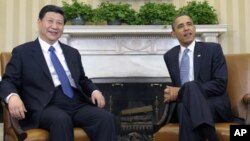China's vice president, Xi Jinping, has met with President Barack Obama at the White House. Obama and China's next president pledged to keep working to strengthen bilateral relations, but also to speak candidly about key differences.
It was the first White House visit for Vice President Xi Jinping, who is expected to become head of China's Communist Party Central Committee this year, and next year replace President Hu Jintao.
With the Chinese leader seated to his right, President Barack Obama said a cooperative U.S.-China relationship is in the interests of the world, adding that China's rise brings with it greater responsibility.
"I have always emphasized that we welcome China's peaceful rise, that we believe that a strong and prosperous China is one that can help to bring stability and prosperity to the region and to the world, and we expect to be able to continue on the cooperative track that we tried to establish over the last three years," said Obama.
Kent Klein's report:
Obama referred to existing strategic and economic dialogues he said have enabled both countries to manage areas of tension. Cooperation, he said, included work in the G20 to manage the global economic crisis, and issues such as North Korea and Iran.
"The main purpose of my visit is to implement the important agreement you had reached with President Hu Jintao and to do some work to move forward the U.S.-China relationship in the right direction set by you and President Hu, that is for our two countries to work together to build a cooperative relationship based on mutual respect and mutual interests," said Vice President Xi, in the polite diplomatic terminology often heard from Chinese officials.
Earlier, Vice President Joe Biden, Xi's formal host for his week-long visit, called the ability of both sides to speak candidly about differences and make progress in bridging them a "sign of the strength and maturity of the relationship."
Outside the White House, protesters demonstrated on a range of issues, including human rights and Tibet, and China's military and Taiwan policies.
The protesters were addressed at one point by Geng He, wife of Gao Zhisheng one of China's most prominent human-rights lawyers who disapeared nearly two years ago. Geng, who was testifying on Capitol Hill later in the day, spoke with VOA.
"Gao Zhisheng is not alone," he said. "There are many, many victims of violation of human rights in China and I [am] standing here as a vivid example of the human-rights situation in China."
In his remarks with Vice President Xi, President Obama mentioned human rights, saying the United States will continue to emphasize "the importance of recognizing the aspirations and rights of all people."
Obama, who has vowed to take a tougher line against unfair trade practices by China, said with China's expanding power, prosperity and increased responsibilities, come a need to work together to ensure that "everybody is working by the same rules of the road."
Vice President Xi also visited the State Department, and the Pentagon for talks with U.S. military officials. On Wednesday, he meets with U.S. congressional leaders before flying to the state of Iowa.





